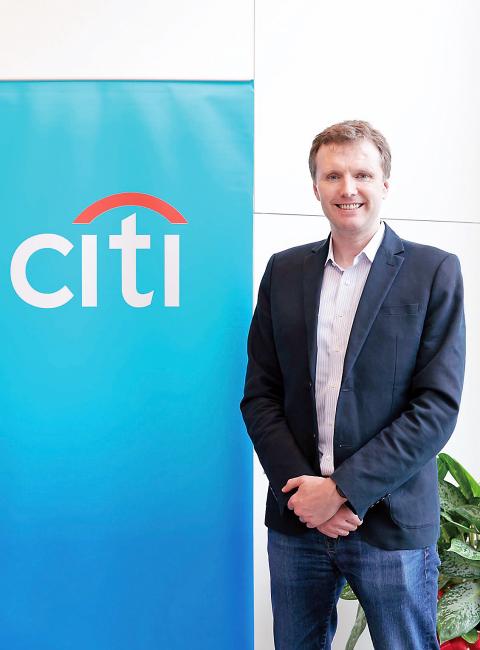Financial technology poses both challenge and opportunity to conventional banks but Citigroup Inc will remain relevant because it knows better about risk management and is adapting to customer behavior changes, top executives said in Taipei yesterday.
The major US banking group recognizes growing competition from non-conventional players but is confident about business and customer increase, guided by the digital-heavy, branch-light business approach, Citi global consumer banking CEO Stephen Bird said.
Bird, who is visiting Taipei on business , said Citibank is to launch new digital capabilities in Taiwan in the second half of the year as the local market ranks top-three in terms of revenue contribution in Asia and top-five globally.

Citibank has a long history of bringing new things to Taiwan and will continue to do so in the future, said Bird, who headed the Asia-Pacific region before being promoted to his current position.
New mobile capabilities
“New mobile capabilities are coming in Asia in the fourth quarter and we are excited about it,” Bird told reporters at its headquarters office in Taipei.
The bank aims to invest more in technology, digitalization, data and analytics because they are strategically important, said Bird, whose company is the world’s largest credit card issuer.
Consumer banking saw a healthy topline increase in the first quarter with business pickup in the US, Asia and Mexico as the industry embraces digitalization, he said.
The group has set up a fintech team under direct supervision of Bird to monitor consumer behavior changes and identify new business opportunity to catalyze growth so Citibank can remain innovative and agile, he said.
Bird said he is aware that technology firms such as Alibaba Group Holding Ltd (阿里巴巴), Tencent Holdings Ltd (騰訊) and even telecom operators may grow into formidable rivals given their mammoth customer base, but Citibank knows better about risk management.
Citibank has no intention of establishing Internet-only banks as it has already been offering online services and products and will continue to innovate and upgrade, he said.
Millions of Citi customers, for instance, have registered with its voice biometrics program and more than 50 percent of customers in Taiwan are using the technology, which helps streamline the authentication process and makes transactions more secure, Bird said.
Citibank would partner with players from other sectors to enhance transaction speed and convenience, he said, citing partnership with local e-commerce operator PChome Online Inc (網路家庭).
Asia has posted seven consecutive quarter of business growth under the stewardship of regional chief Anand Selvakesari, Bird said.
“We’re seeing healthy growth in card business and in digital lending. ….We are also seeing strong growth in wealth management business and are gaining customers digitally,” he said.
The light-branch model means digital platforms will be the primary channel by which Citi services and engages operates, while physical branches will continue to evolve to reflect how customers bank today and in the future, Citibank said.
The local branch will roll out new promotion campaigns in the second half of the year to demonstrate the evolution.

Semiconductor business between Taiwan and the US is a “win-win” model for both sides given the high level of complementarity, the government said yesterday responding to tariff threats from US President Donald Trump. Home to the world’s largest contract chipmaker, Taiwan Semiconductor Manufacturing Co (TSMC, 台積電), Taiwan is a key link in the global technology supply chain for companies such as Apple Inc and Nvidia Corp. Trump said on Monday he plans to impose tariffs on imported chips, pharmaceuticals and steel in an effort to get the producers to make them in the US. “Taiwan and the US semiconductor and other technology industries

A start-up in Mexico is trying to help get a handle on one coastal city’s plastic waste problem by converting it into gasoline, diesel and other fuels. With less than 10 percent of the world’s plastics being recycled, Petgas’ idea is that rather than letting discarded plastic become waste, it can become productive again as fuel. Petgas developed a machine in the port city of Boca del Rio that uses pyrolysis, a thermodynamic process that heats plastics in the absence of oxygen, breaking it down to produce gasoline, diesel, kerosene, paraffin and coke. Petgas chief technology officer Carlos Parraguirre Diaz said that in

SMALL AND EFFICIENT: The Chinese AI app’s initial success has spurred worries in the US that its tech giants’ massive AI spending needs re-evaluation, a market strategist said Chinese artificial intelligence (AI) start-up DeepSeek’s (深度求索) eponymous AI assistant rocketed to the top of Apple Inc’s iPhone download charts, stirring doubts in Silicon Valley about the strength of the US’ technological dominance. The app’s underlying AI model is widely seen as competitive with OpenAI and Meta Platforms Inc’s latest. Its claim that it cost much less to train and develop triggered share moves across Asia’s supply chain. Chinese tech firms linked to DeepSeek, such as Iflytek Co (科大訊飛), surged yesterday, while chipmaking tool makers like Advantest Corp slumped on the potential threat to demand for Nvidia Corp’s AI accelerators. US stock

SUBSIDIES: The nominee for commerce secretary indicated the Trump administration wants to put its stamp on the plan, but not unravel it entirely US President Donald Trump’s pick to lead the agency in charge of a US$52 billion semiconductor subsidy program declined to give it unqualified support, raising questions about the disbursement of funds to companies like Intel Corp and Taiwan Semiconductor Manufacturing Co (台積電). “I can’t say that I can honor something I haven’t read,” Howard Lutnick, Trump’s nominee for commerce secretary, said of the binding CHIPS and Science Act awards in a confirmation hearing on Wednesday. “To the extent monies have been disbursed, I would commit to rigorously enforcing documents that have been signed by those companies to make sure we get